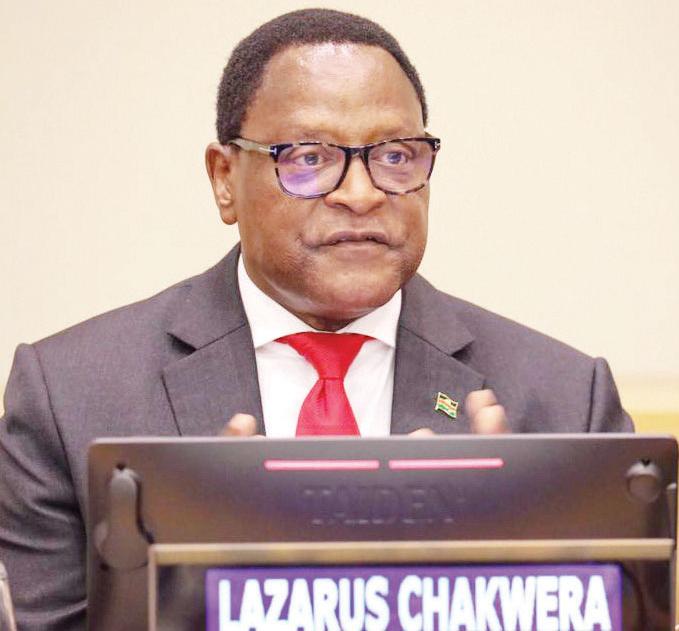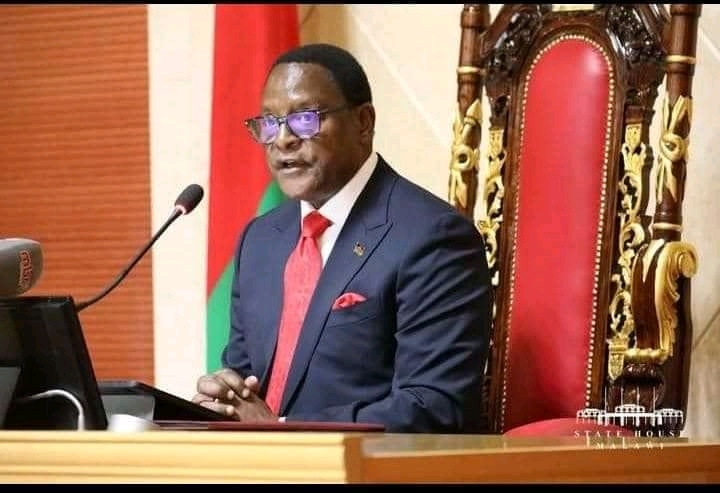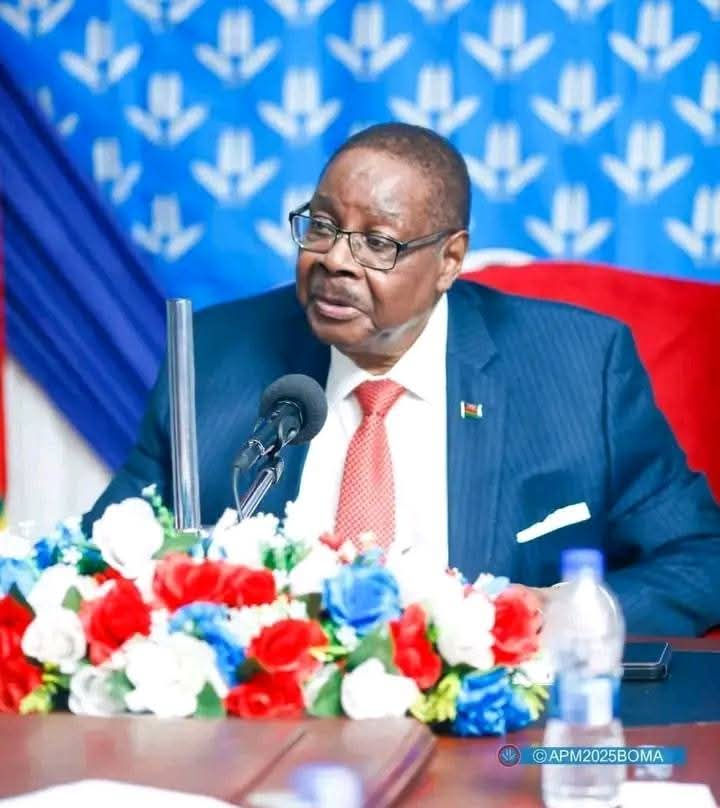Conducted by Burnett Munthali for Malawi Freedom Network
Introduction
Good day, and welcome to this exclusive interview. Today, we have the honor of speaking with Rick Dzida, a prominent Malawian social commentator renowned for his sharp insights on national issues.
In this session, we will delve into the political and social implications of Vice President Dr. Saulos Chilima’s sudden death, a tragedy that has left the nation in shock. Mr. Dzida will share his perspective on how this unprecedented event might shape Malawi’s political landscape and governance moving forward.
Stay tuned as we engage in a thought-provoking discussion with one of Malawi’s leading voices.
In a recent address, President Lazarus Chakwera urged Malawians to persevere and grant him another chance, asserting that his first five years were dedicated to “fixing the bones/wound.” As a prominent social commentator, Rick Dzida provides an insightful analysis of this statement and its wider implications on Malawi’s socio-economic and political landscape.
Questions
Section 1: General perception
1) What is your initial reaction to President Chakwera’s remarks about “fixing the bones/wound” over the past five years?
Rick Dzida: “It’s clear that President Chakwera is acknowledging his administration’s failures. This statement feels more like an attempt to seek sympathy from the electorate rather than presenting a tangible record of achievements. It’s an attempt to mask his leadership’s shortcomings by invoking a metaphor that implies there was some larger, unaddressed problem he inherited.”
2) In your opinion, has this metaphor resonated with the majority of Malawians? Why or why not?
Rick Dzida: “No, it hasn’t resonated with most Malawians. Instead of sympathy, the majority are frustrated by the worsening economic conditions, including high inflation, fuel shortages, and rising prices. Many people feel that enough is enough. They’re tired of the rhetoric without real action.”
3) Do you believe this statement reflects the reality of the current socio-economic situation in Malawi?
Rick Dzida: “Absolutely not. If Chakwera’s government has been ‘fixing the bones,’ then the bones have only gotten weaker. The socio-economic situation is deteriorating, not improving. The very issues he talks about, like economic recovery, are still unresolved after four years under his leadership.”
Section 2: Leadership and accountability
4) How would you assess President Chakwera’s performance over the past five years?
Rick Dzida: “Chakwera’s performance has been the worst of any recent Malawian president. Under his watch, public services have suffered, and the country’s economy is in disarray. The public sector is struggling, with resources mismanaged and people left to bear the consequences.”
5) Do you think the challenges Malawi faces today—forex shortages, unemployment, fuel scarcity—are a result of poor governance or inherited structural issues?
Rick Dzida: “The current crises stem from poor governance. When Chakwera took office in 2020, the system was intact, and Malawi wasn’t facing the forex and fuel shortages we now endure. Over the last four years, Chakwera’s administration has depleted resources without addressing structural issues or implementing effective policies to ensure stability.”
6) What specific actions, if any, would you have expected from Chakwera to “heal the wound” effectively?
Rick Dzida: “Upon assuming office, Chakwera should have conducted a thorough audit across all government ministries to identify inefficiencies and corruption. Policies should have been devised to stabilize the economy and secure foreign exchange. Unfortunately, Chakwera failed to do this, and now he is part of the same system of corruption that plagues the country.”
Section 3: Perseverance and trust
7) Do you believe Malawians have shown sufficient perseverance over the past five years, given the hardships they have endured?
Rick Dzida: “Yes, but they had little choice. Once a government is elected, the people have to endure until the next elections. But it’s clear that the public’s patience is wearing thin, and their perseverance is being tested.”
8) In your opinion, is asking for another chance justified, or does it indicate a failure to deliver during the initial term?
Rick Dzida: “It’s not justified. Asking for another chance is simply an admission that the current government has failed. It is an appeal for sympathy, not a record of achievement.”
9) Do you think the government’s communication with the public has been transparent and sufficient to inspire trust?
Rick Dzida: “Initially, Chakwera’s government tried to be transparent, with programs where the president communicated directly with citizens. However, as economic problems deepened, trust in the government eroded. Now, the government’s spokespersons, like Minister Moses Kunkuyu, seem like robotic defenders of the regime, rather than genuine communicators.”
Section 4: Future prospects
10) Based on Chakwera’s track record, do you believe he deserves a second chance to lead Malawi? Why or why not?
Rick Dzida: “No, he doesn’t deserve it. Chakwera has proven to be an excellent orator but a poor leader. His focus has been on international travel and luxury while ordinary Malawians suffer. He has failed to address the real issues at home, and it’s hard to justify a second term for someone who has so clearly failed.”
11) What key changes or priorities would you advise for Chakwera should he secure another term in office?
Rick Dzida: “He needs to adopt policies that directly benefit the average Malawian. There should be a shift from appeasing elites to addressing the needs of the people. It’s time for tangible action on corruption, economic management, and improving living standards.”
12) How can Malawians hold leaders accountable for promises made during campaigns and in office?
Rick Dzida: “There are many avenues for accountability. Malawians need to be more informed about their rights and actively participate in the political process. Civil society organizations and the media have a vital role to play. We need more civic engagement and less fear of challenging the system. It’s crucial to report power abuse and support movements that hold leaders accountable.”
Section 5: Public sentiment
13) In your opinion, how do ordinary Malawians perceive Chakwera’s leadership and his plea for patience?
Rick Dzida: “Many Malawians are deeply disillusioned. The standard of living has worsened under Chakwera’s rule, and people are tired of the endless promises with little action. Chakwera’s leadership is increasingly seen as a failure.”
14) What role do you think civil society and the media should play in shaping public discourse around such remarks?
Rick Dzida: “Civil society and the media should be more assertive. Unfortunately, many civil society organizations have become partisan, failing to challenge the government as they once did with the Mutharika regime. The media should push for more accountability and expose failures while holding both the government and opposition to account.”
15) How do you think Chakwera’s statement will influence the upcoming elections?
Rick Dzida: “By publicly acknowledging his failure, Chakwera has opened the door for the electorate to think critically before casting their vote. Many will reconsider voting for a president who admits his own inadequacy.”
Closing question
16) If given the opportunity to address President Chakwera directly, what would be your message regarding his plea for patience and his vision for Malawi’s future?
Rick Dzida: “I would tell him that Malawians are tired. It’s time to stop making excuses and focus on delivering results. If he truly cares about Malawi’s future, he should focus less on his personal ambitions and more on the well-being of ordinary citizens. If he is truly sorry for the state of the nation, he should take responsibility and stop deflecting blame.”
Conclusion
Rick Dzida’s insights shed light on the growing frustration among Malawians with President Chakwera’s leadership. With the 2025 elections around the corner, the public’s sentiment toward the current administration is shifting, and many are questioning whether Chakwera deserves another term. The time for change, according to Dzida, is now.




